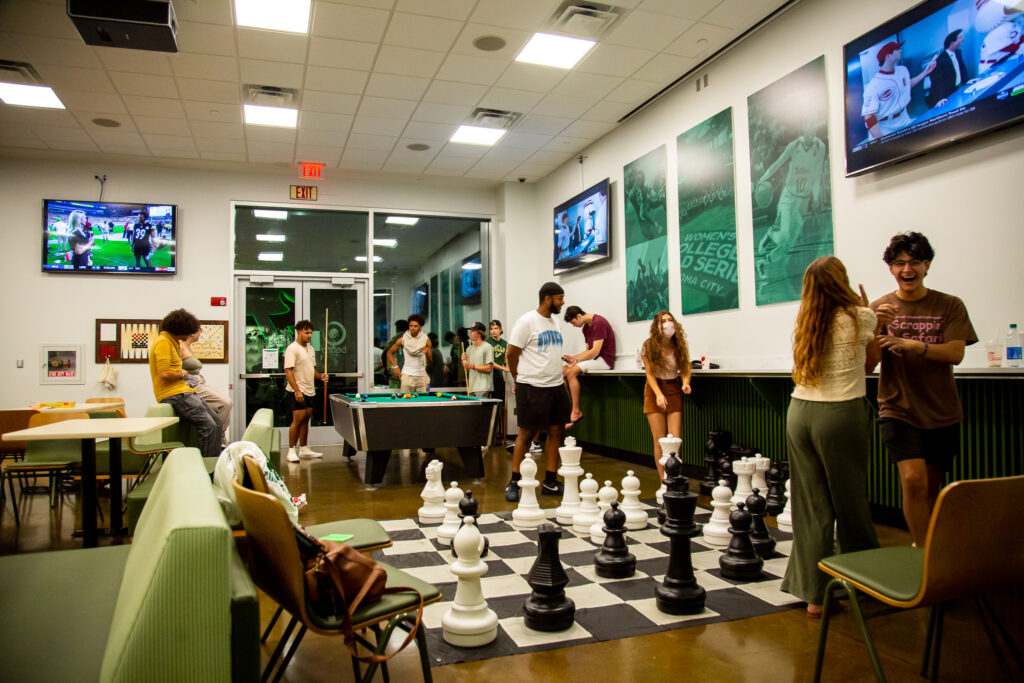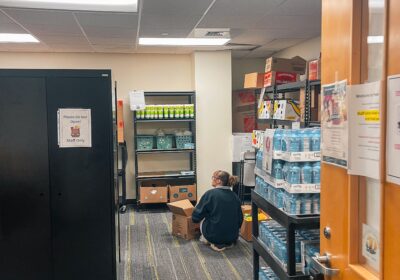Students and faculty prepare to navigate new normal in the fall

As preparations are being made to return to campus for the fall semester, students and faculty will encounter numerous changes, such as the absence of mask mandates and random testing compared to a previous school year of online learning.
With hardly any mandates and regulations, some students are feeling uncertain about the change. Secondary English education and music studies major Lily Potter said her biggest concern about returning to in-person classes is readjusting to the traditional classroom setting.
“Some of my biggest concerns about returning to in-person classes include increased interpersonal connections and changing class formats,” Potter said. “Since a large majority of my classes were completely online my first year, I have become accustomed to virtual learning.”
For senior Melina Sanchez, new social interactions on campus will be a challenge she’s expecting to face.
“I’ve gotten so used to online classes that I actually prefer it, so therefore I’ve chosen a majority of my classes to be online,” she said. “But for my in-person classes, I’m just trying to prepare myself to interact with classmates face to face for the most part, as that’s the thing I’m thinking about the most.”
Sophomore Haley Campbell said while the prospect of meeting new people can be exciting for some students, it may be difficult to initially overcome.
“My biggest concern, especially going into this year as a [resident assistant], is trying to get students to be more social and really enjoy their experience here by getting involved and meeting new people,” she said. “I think the students will be very hesitant to do that, and it’s going to be difficult to get people interacting with one another again.”
The school year may present new customs and challenges for all students, but for those who have never taken an in-person college class before, adjusting to the new normal may come with numerous positives and negatives.
Patrick Meehan said returning as a sophomore to experience in-person campus activities is just as exciting as it is concerning.
“I got so used to having absolutely nothing to do last year and I learned to have fun with it, so I can’t even imagine the good times I’ll be able to have with actual activities on campus,” he said. “It should be way easier to meet new people and feel more connected to the university this year. Hopefully I’ll actually feel like a USF student rather than someone living on a deserted campus.”
Faculty Senate President Timothy Boaz said there are many reasons for sophomores to be eager about returning to classes.
“I would guess that sophomores are very excited about the possibility of getting back into the classroom,” he said. “I’m sure they missed that sort of experience, the opportunity to get to know their classmates better in a more meaningful way when you’re in the same physical space.”
He also said he expects reactions about returning to classes to be mixed, as there has been a divide over students who prefer online or face-to-face learning.
Brian Connolly, Faculty Senate member-at-large, said returning to in-person classes may be an exciting prospect for most students, but they should always reach out if they need help adjusting to the new normal.
“For those who are second-year students who have never really been on campus, they should feel comfortable asking their professors if they have questions or concerns about their discomfort of returning to campus,” he said. “I think most faculty are going to be more than happy to answer any questions and that’s going to help if people are more willing to ask.”
Though some students and faculty members see lots of positives in returning to in-person campus experiences, there are still concerns about making a complete return to the classroom given the worsening conditions of the pandemic in Florida.
Boaz said faculty have been worried about making the transition to in-person learning with no control over the safety of their own classrooms.
“The delta variant has really dramatically increased the number of cases and I think I would say at this point, faculty are quite concerned about going back into the classroom,” Boaz said. “This is especially true given the fact that we are not allowed to impose any requirements for face coverings or vaccinations in the state of Florida.”
The decision to switch from online to in-person classes was made due to the widespread availability of the COVID-19 vaccine, Dean of the College of Public Health Donna Petersen said during an Aug. 13 town hall. She said the university is maintaining some previous safety measures and is confident that with the vaccine, it will be much easier to keep students and faculty safe.
“We now know how to keep our spaces as safe as possible if people are vaccinated and wear masks. We’re maintaining our enhanced cleaning, we’re reminding everyone to wash their hands and we’re reminding everyone to stay home if they don’t feel well,” she said.
“All of those things worked for us in the past without the vaccine, so when you add the vaccine to this mix, we’re pretty confident that that’s a significant enough change that we can go forward as planned, unless we are directed otherwise.”
Richard Manning, Faculty Senate sergeant-at-arms, said while being vaccinated and wearing a mask helps, those measures do not provide immunity which allows the variant to pose a threat to all students on campus.
“Don’t think that the vaccine is necessarily going to protect you from getting infected or becoming infectious, but it will protect you from getting seriously ill. Therefore, mask up, and do not resent the mask. The mask is your friend.”
He also said the current conditions regarding the pandemic should put a pause on the reopening plans of the university.
“Until the positivity rate goes down, everything should be online again. It will disappoint some people that they don’t get to have the regular college experience, but the regular college experience is not safe right now,” he said.
Connolly said he believes removing some virtual components and returning to the classroom presents numerous risks, especially with the various limitations placed upon them.
“I think not giving the faculty the opportunity to use online components as effectively as possible to try to manage those strategies is tough, whether it’s splitting the class in half for the first few weeks and having some people online and some people in person,” he said. “Most of that’s been made difficult for us by the administration.”
While USF stated it plans to create a safe environment for students and faculty, finance major Jessica Baus said the removal of these guidelines is still premature.
“With everything that I’ve heard about the delta variant and warnings from officials that the virus is still very well out there, I want to play it safe for my friends out there who are immunocompromised and still undergo all the correct procedures for doing so,” Baus said.
Though returning to in-person campus experiences has both its positives and negatives, Boaz said students should make their voices heard in order to see effective changes made in the future.
“If students are uncomfortable with things, they should reach out to their elected officials and the university administration, and tell them what they would like to see,” he said.
“There’s a lot of assumptions being made by everyone, about what students want and what faculty want. I think students don’t feel like their voice is being heard, and they should speak up about whatever they think.”







